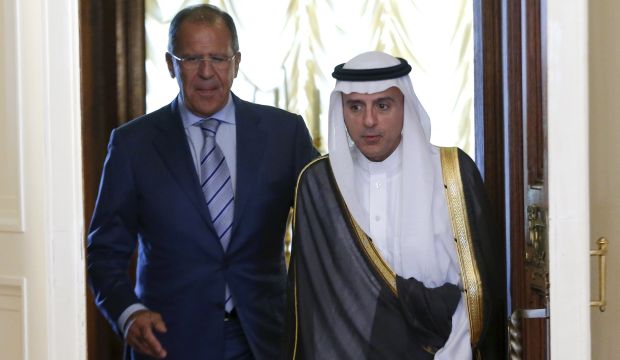
Russian Foreign Minister Sergei Lavrov (L) and Saudi Foreign Minister Adel Al-Jubeir enter a hall during their meeting in Moscow, Russia, on August 11, 2015. (REUTERS/Maxim Shemetov)
Saudi Arabia’s position on the Syrian crisis has not changed, Jubeir told reporters after meeting with his Russian counterpart Sergei Lavrov in Moscow.
“There is no place for Assad in the future of Syria,” Jubeir said, reiterating that “Assad is part of the problem, not part of the solution.”
This is Jubeir’s first visit to Moscow since he became foreign minister and comes amid a warming of relations between the two countries.
Jubeir and Lavrov called for a fresh push to reach a solution to the four-year-old crisis in Syria, but the Saudi FM was quick to remind his Russian counterpart that Assad “has lost legitimacy” and any political solution should lead to his departure.
“Despite divergence in the points of view between the two countries on the Syrian crisis, there is convergence toward the importance of uniting the ranks of the Syrian opposition,” Jubeir said.
By choosing to crackdown on civilians, instead of terrorist groups, Jubeir argued, Assad became “one of the main reasons for the growth of the Islamic State of Iraq and Syria (ISIS).”
Jubeir’s comments come after rumors that several regional powers, including Saudi Arabia, Turkey and Jordan, may work with Assad to defeat ISIS in Syria.
The Saudi FM said: “The Kingdom has not changed its position on the Syrian crisis and there is no truth at all to any statements otherwise.”
Meanwhile, Lavrov announced he would host separate talks in Moscow with representatives of Syrian opposition groups. They include Khaled Khoja, leader of the western-backed Syrian National Coalition; Salih Muslim, leader of the Kurdish People’s Protection Units (PYD) militia, which has proved a useful US ally in fighting ISIS; and Haytham Manaa’, spokesman for the Syria-based National Coordination Committee.
Jubeir and Lavrov also addressed the situation in Yemen where Saudi Arabia has launched a military campaign against Houthi rebels.
They stressed the need for an immediate ceasefire and the resumption of peace talks based on the UN Security Council resolutions on Yemen.
